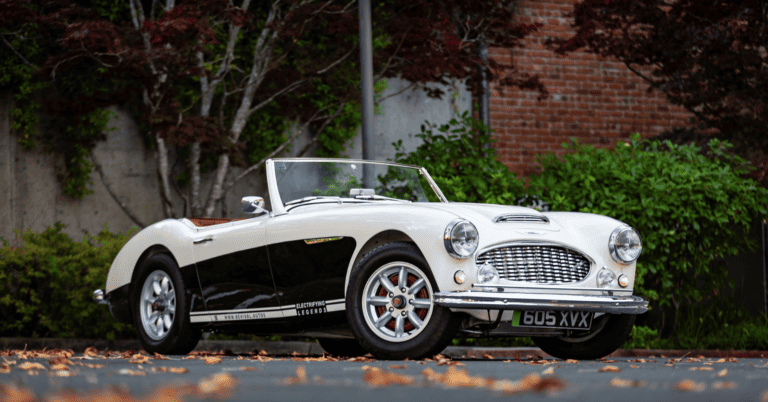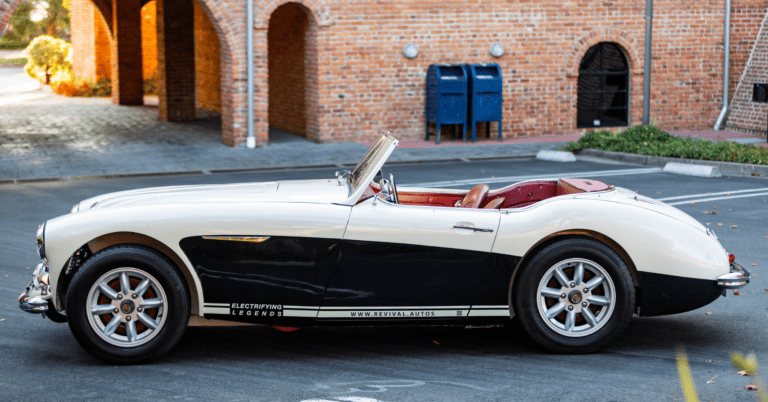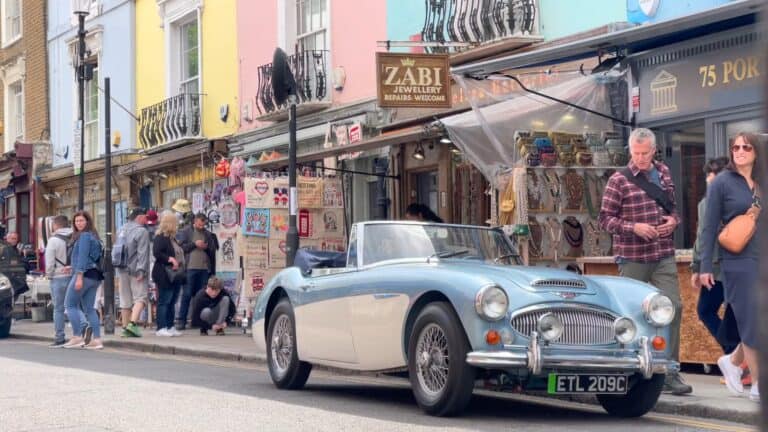In the ever-evolving landscape of automotive innovation the resurgence of electric classic cars presents a fascinating fusion of nostalgia and sustainability. These vintage gems, reborn with electric hearts are captivating the imaginations of both classic car aficionados and environmentally conscious drivers. In this comprehensive exploration, we will delve into the world of electric classic cars, meticulously dissecting their costs, benefits, and performance, steering clear of clichés to provide you with a fresh perspective.
The Electric Renaissance of Timeless Classics
Elevating Tradition with a Green Twist
Classic cars have always held an intrinsic allure, cherished for their timeless aesthetics and historical significance. Yet, the romanticism of these beauties often clashed with their carbon footprints, as their fuel thirsty engines guzzled gasoline with abandon. The advent of electric classic cars rekindles our affection for these automotive relics by gifting them a green makeover.
The Art of Restoration and Transformation
Converting a classic car into an electric vehicle is an art form, requiring a harmonious blend of engineering expertise and artisanal craftsmanship. Each project embarks on a meticulous journey, with skilled hands delicately preserving the car's original charm while ingeniously integrating modern electric components. The transformation is not just a mechanical upgrade; it's a rebirth, where the past marries the future.
electric classic cars: The Financial Equation
The Price of Entry
When considering electric classic cars, the initial cost often raises eyebrows. Converting a classic car into an electric marvel can indeed be a substantial investment, sometimes exceeding the price tag of acquiring a traditional classic car. However, it's essential to look beyond this upfront expense to uncover the financial nuances that make this endeavor intriguing.
The Economics of Operation
Owning an electric classic car begins to make financial sense when we delve into its operational costs. Electricity as a fuel source, tends to be notably cheaper than gasoline. Moreover, electric vehicles (EVs) are endowed with simplicity; they feature fewer moving parts compared to their internal combustion counterparts, which translates into lower maintenance expenses. In some regions, governments offer incentives, tax breaks, and rebates for electric vehicle owners, creating a significant dent in the total cost of ownership.
Resale Value: A Greener Future Investment
In the world of classic cars, value retention is a given. Electric classic cars are no exception. As society propels towards greener transportation solutions, the demand for these unique, eco conscious vehicles is expected to soar. This growing demand could lead to an appreciation in their resale value, making them not just a purchase but a future proof investment.
The Advantages Beyond the Obvious
Eco Friendly Joyrides
While the environmental benefits of electric classic cars are apparent, their impact is profound. With zero tailpipe emissions, they contribute significantly to reducing air pollution and mitigating the carbon footprint. Every nostalgic joyride becomes an eco-friendly statement, connecting the past with a sustainable future.
Silent Elegance
Gone is the raucous rumble of traditional engines. Electric classic cars offer a refined, near silent driving experience. The absence of engine noise enhances the nostalgic journey, allowing you to savor the serenity of your classic ride. It's the symphony of tire treads meeting the road, the rustle of leaves, and the whispers of the wind as you glide through time.
Low-Maintenance Luxury
Traditional classic cars are often associated with maintenance headaches, from oil changes to complex engine repairs. In stark contrast, electric classic cars require far less attention. Their streamlined design and reduced mechanical complexity mean fewer visits to the mechanic and more time spent enjoying the open road.
Performance of electric classic cars
Electrifying Acceleration
One of the most exhilarating aspects of electric classic cars is their breathtaking acceleration. Electric motors deliver power instantly, transforming vintage vehicles into spirited performers. Each press of the pedal propels you forward with a surge of torque, merging the elegance of the past with the dynamism of the future.
Range: The Journey Uninterrupted
The range of electric classic cars varies depending on factors such as battery capacity and conversion efficiency. However, advancements in battery technology have extended the horizons of these vintage icons. Many electric classic cars now boast respectable ranges on a single charge, making them not just showpieces but practical daily drivers.
Handling Refined
Electric classic cars often deliver an improved handling experience, courtesy of the strategic placement of heavy battery packs low in the chassis. This low center of gravity enhances stability and cornering, elevating the pleasure of driving these classics to a new zenith.
Here's a comprehensive table summarizing the key points about electric classic cars in terms of costs, benefits, and performance:
|
Aspect |
Description |
|
electric classic cars |
|
|
Conversion Costs |
Initial investment can be high, exceeding the cost of acquiring a traditional classic car. |
|
Running Costs |
– Operating expenses are generally lower due to cheaper electricity compared to gasoline. Reduced maintenance needs as EVs have fewer moving parts. – Potential for government incentives and tax breaks. |
|
Resale Value |
Classic cars typically retain their value, and electric classic cars are expected to appreciate with growing demand for sustainable transportation. |
|
Benefits of electric classic cars |
|
|
Eco-Friendly Driving |
Zero tailpipe emissions contribute to reduced air pollution and a smaller carbon footprint. |
|
Silent and Serene Ride |
– The absence of engine noise provides a quiet, peaceful driving experience, enhancing the nostalgic journey. |
|
Lower Maintenance |
– Electric classic cars require less maintenance than their traditional counterparts, reducing trips to the mechanic. |
|
Performance Comparison |
|
|
Acceleration |
– Electric motors provide instant torque, resulting in impressive acceleration, akin to a sports car. |
|
Range |
– The range varies based on battery capacity and efficiency but has been extended with advancements in battery technology. |
|
Handling |
– Electric classic cars often have improved handling due to the strategic placement of heavy batteries, enhancing stability and cornering. |
This table offers a concise overview of the various aspects of electric classic cars, helping readers quickly grasp the key points related to costs, benefits, and performance.
A Timeless Conclusion
In the realm of electric classic cars, a harmonious blend of nostalgia and sustainability takes center stage. While the initial investment may appear daunting, the long-term rewards in terms of reduced operational costs, environmental responsibility, and an electrifying driving experience make it a compelling proposition.
Whether you are an impassioned classic car devotee seeking a sustainable transition or an eco-conscious individual yearning for a taste of automotive history, electric classic cars offer an irresistible fusion of style, performance and eco-responsibility. In a world that is steering towards electrification these electrified classics are poised to continue gracing the roads, evoking admiration and reverence for generations to come. It's a journey where the past embraces the future, and the result is nothing short of electric perfection.
Revival Autos
Revival Autos stands at the forefront of automotive innovation, specializing in the meticulous transformation of classic cars into environmentally conscious marvels. Fueled by deep appreciation for automotive heritage, our team excels in the art of converting vintage vehicles. We can convert your vehicle into state-of-the-art electric classic cars. Through a fusion of craftsmanship and cutting-edge technology, we seamlessly harmonize the timeless elegance of the past with a forward-thinking environmental ethos. At Revival Autos we take pride in our role as pioneers in the industry, elevating classic cars into eco-friendly icons while ensuring a sustainable automotive legacy for generations to come.
FAQs
What are electric classic cars?
electric classic cars refer to vintage or classic automobiles that have undergone conversion from traditional internal combustion engines to electric propulsion systems. This transformation entails replacing the conventional engine with an electric motor and integrating a battery pack and associated components to enable electric operation.
What are the advantages of electric classic cars?
The merits of electric classic cars include:
- Substantial reductions in carbon emissions and environmental impact.
- Lower operational costs due to the efficiency of electric motors.
- Quieter and smoother operation.
- Preservation of the classic car’s aesthetics while introducing modern, sustainable technology.
Are electric classic cars environmentally friendly?
Yes, electric classic cars demonstrate enhanced environmental friendliness compared to their gasoline or diesel counterparts. They emit no tailpipe pollutants, contributing to improved air quality and reduced air pollution. Moreover, they aid in diminishing the overall carbon footprint when charged with renewable energy sources.
What are the ecological benefits of driving an electric classic car?
The ecological advantages of driving an electric classic car encompass:
- Mitigation of greenhouse gas emissions.
- Reduced dependence on fossil fuels.
- Conservation of historically significant and classic vehicles.
What is the performance of an electric classic car like?
The performance of electric classic cars is notable. Electric motors deliver instantaneous torque, resulting in rapid acceleration and a quiet, seamless driving experience. Additionally, they often offer superb handling characteristics due to the low center of gravity achieved through strategic battery placement.
How does performance of electric classic cars compare to gasoline-powered ones?
Electric classic cars can provide superior performance. It can give enhanced acceleration and handling when compared to gasoline cars. But, factors such as range and charging infrastructure may vary. It can affect long distance travel capabilities.
How long does it take to charge an electric classic car?
Charging times for an electric classic car are contingent upon battery capacity and the charging equipment employed. Typically it can take several hours to attain a full charge. Fast charging stations can significantly reduce this time. For example, it can deliver an 80% charge in approximately 30 minutes.
How far can an electric classic car travel on a single charge?
The range of an electric classic car on a single charge is variable, hinging on the specific conversion and battery capacity. It can span from approximately 50 miles for some conversions to over 300 miles for high-end electric classic cars with larger battery packs.
What is the range of an electric classic car on a full charge?
The range of an electric classic car on a full charge can vary considerably, but typically falls within the range of 50 to 300 miles, contingent upon the particular conversion and battery capacity.
How long does the battery last in an electric classic car?
The lifespan of an electric classic car’s battery is contingent upon multiple factors, including usage patterns, temperature conditions, and battery quality. Generally, modern lithium-ion batteries can endure over 100,000 miles before experiencing noticeable capacity degradation.
Is maintaining an electric classic car challenging?
Maintaining an electric classic car can be less arduous and costly than maintaining a gasoline-powered counterpart. Electric motors feature fewer moving parts, necessitating less frequent maintenance, such as oil changes. Nonetheless, battery upkeep and potential replacement may be required over time.
Are electric classic cars dependable?
Electric classic cars are often regarded as more dependable owing to their simpler drivetrains and diminished wear and tear on components. However, reliability is also influenced by the quality of the conversion and maintenance practices.
Do electric classic cars retain their original value?
Electric classic cars can preserve or even appreciate in value, particularly if the conversion is executed meticulously while preserving the original aesthetics. Increasing interest in electric classic cars can contribute to their value appreciation.
Which company specializes in electric classic car conversions?
Numerous companies specialize in electric classic car conversions, including well-established entities such as Revival Autos.
Where can I have my classic car converted to electric?
Conversion of a classic car to electric can be carried out at specialized conversion shops, electric vehicle conversion companies, or by proficient DIY enthusiasts with the requisite expertise and tools.
How much does it cost to convert a classic car to electric?
The price for converting classic car to electric can vary considerably. It mainly is up to factors such as the vehicle’s make and model. It also depends on very very specific components that are used. The intricacy of the conversion process also costs a bit more. Costs can span from $10k to well above $100k
Are there government incentives for converting a classic car to electric?
In select regions, incentives or rebates may be available for converting classic cars to electric, although their availability varies by location. It is advisable to consult local authorities or environmental agencies for specific incentives.
Are there tax incentives for converting classic cars to electric?
Tax incentives for converting classic cars to electric may be accessible in certain areas, offering tax credits or deductions to offset conversion costs. Consultation with a tax professional or government agency is recommended for precise details.
What does the future hold for electric classic cars?
The future of electric classic cars appears promising as an increasing number of individuals embrace sustainable transportation. The electric classic car conversion market is likely to expand further, driven by advancements in battery technology and the evolution of charging infrastructure, enhancing their appeal.
How does Revival Autos contribute to the evolution of electric classic cars conversions?
Revival Autos isn’t just a part of the electric classic cars (ECCs) conversion industry; they’re leading the charge with a combination of technical brilliance and a deep passion for preserving the essence of classic cars. Their secret sauce? They seamlessly marry the soul of these vintage beauties with cutting-edge electric powertrains. In fact, they don’t just meet expectations; they consistently raise the bar, setting new standards for ECCs. As a result, Revival Autos is steering the course toward a sustainable and electrifying future for classic car enthusiasts and collectors alike.





